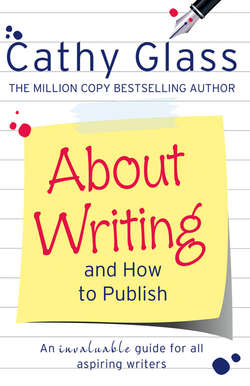Читать книгу About Writing and How to Publish - Cathy Glass, Cathy Glass - Страница 11
Оглавление
It has been said that writing is 1 per cent inspiration and 99 per cent perspiration. Although this is a misquote – Thomas Edison, the inventor, actually said, ‘Genius is 1 per cent inspiration and 99 per cent perspiration’ – the words still demonstrate the point admirably. Writing, as with most other creative endeavours, requires a lot of hard work, and what you achieve will be the result of your labour rather than any sudden insight – although inspiration will be your guide. That first creative draft will have been an adventure, as your story unfolds and your characters reveal themselves through various, often dramatic, situations. You will have been on an adrenalin-fuelled rollercoaster of emotion as you wrote that first draft. Now you will need to spend time revising and rewriting your work until it is as good as you can make it. Unless, of course, your writing is for your eyes only; then all that matters is that you are happy with what you have written.
Most writers, however, want to share their work, and before you submit it to a literary agent or a publisher you will need to ensure your work is as clear of imperfections as possible. While an agent or publisher might overlook a few typing errors, he or she will not be impressed if your work is littered with irritating and basic grammatical errors, has a lack of or inappropriate use of punctuation or is poorly set out. Agents and publishers are far too busy with other writers’ work to spend time trying to decipher your illiterate text, and so what might have been a bestseller may never see the light of day. As the writer Isaac B. Singer said: ‘The waste-paper basket is the writer’s best friend.’ Or to bring this quote up to date, the delete key on your computer keyboard should be your best buddy. Like many writers, I probably throw away more words than I keep as I strive for perfection, finding a better word or phrase, restructuring a sentence, exchanging one idea for another or rewriting a paragraph, page, chapter or even the whole book.
Revising and rewriting are just as important as that first creative draft. While rewriting is hard work, it is also marvellously satisfying as you hone and polish your work to as near perfection as you can make it. Time spent on revising your work can make the difference between it being accepted for publication or rejected. You can revise and edit on your computer or on a paper copy. I do both, as I find some errors and omissions easier to spot with print on paper than on screen. I revise a book at least six times before I send it to my agent. When I write an article – where the length of the piece is preset and words are therefore at a premium – I often revise it a dozen times or more. I also read the article out loud, as hearing it gives a new and more objective viewpoint. I ask myself: have I said everything I need to say clearly and concisely? Are any words superfluous and can they therefore be removed? Does the article flow easily from one point to the next? As Nathaniel Hawthorne, the nineteenth-century American novelist and short story writer, said: ‘Easy reading is damn hard writing.’
A revised page from this book
In addition to checking your spelling, grammar, punctuation and layout (more on that later), ask yourself: does your story flow, and will others reading your work for the first time understand it? Have you given sufficient background information or far too much? I agree with Elmore Leonard, novelist and screenwriter, who said: ‘Leave out the parts that people skip.’ It’s very difficult to be objective about your own work; having invested so much time in it, you’re too involved. So if you have a family member or a close friend whose opinion you value, I suggest you ask them to read your work before you submit it to an agent or publisher. A fresh perspective is often invaluable for spotting inconsistencies or omissions, as well as seeing silly spelling and grammar mistakes that you have missed. I’m not suggesting you change your story purely as a result of your reader’s comments; only that you listen to what they say and give their opinions serious consideration. Don’t take their criticism personally; it is not you they are criticizing, but your work. So often we are overprotective of our writing – seeing it as an extension of ourselves, as our ‘baby’ – and thereby we miss out on an opportunity to improve it.
